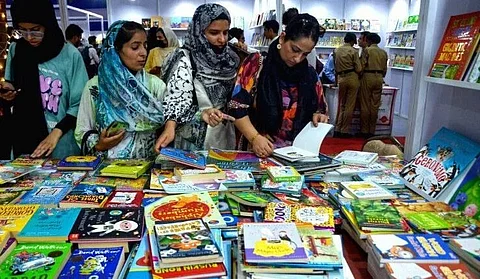

The prohibition of 25 books in Jammu and Kashmir—including works by Arundhati Roy, A.G. Noorani, Sumantra Bose, and Tariq Ali—is not just censorship, but an attempt to control history, silence scholarship, and erase the collective memory of a people.
The ban, imposed under the pretext of preventing “secessionist narratives” and the “glorification of terrorism,” criminalises research, suppresses documented truths, and seeks to rewrite the record of Kashmir’s political and human rights history. This is not a defence of national security—it is a bid to justify the present by reshaping the past.
When a state fears books, it fears the truth. When it outlaws literature that documents human rights abuses, political grievances, and historical realities, it exposes its own insecurity. These books do not incite violence; they expose it. They do not distort history; they record it. Silencing these voices does not protect democracy—it dismantles it.
The works targeted in this ban include historical accounts, constitutional and legal analyses, and personal testimonies. None of them advocates violence. They provide informed perspectives on Kashmir’s political struggle, India’s military policies, and the lived experiences of people under occupation.
1. The Kashmir Dispute 1947–2012 – A.G. Noorani
A renowned constitutional expert, Noorani offers a meticulous examination of Kashmir’s legal and political history, from the contested accession to India’s failure to hold the promised plebiscite. He writes: “What the people of Kashmir desire is self-rule. The present arrangements do not give them the feeling that they have got it. The feeling may be justified or unjustified; the important point to note is that it exists, and as long as it exists, the problem of Kashmir will remain unsolved. On the issue of accession, it is necessary to remember a few facts. The accession of Kashmir is not of the same type as the accession of other States. It is a limited accession restricted only to three subjects: defence, foreign affairs and communications.”
2. Kashmir: The Case for Freedom – Tariq Ali, Arundhati Roy, et al.
This anthology gathers essays from prominent scholars and journalists on the militarisation of Kashmir. Roy writes: “To call Kashmir an ‘integral part of India’ while stationing half a million soldiers there, enforcing curfews, and criminalising dissent is Orwellian. No democracy should fear its own history.” Does this amount to terrorism—or is it simply a fearless indictment of state repression?
3. Kashmir at the Crossroads – Sumantra Bose
Bose, a political scientist, examines the conflict through historical, political, and geopolitical lenses. He observes: “The Indian state’s reliance on brute force—mass arrests, pellet guns, and draconian laws—has only deepened alienation. Peace cannot be achieved by erasing memory.”
If such analysis is banned, it speaks volumes about the government’s hostility to intellectual freedom.
Echoes in International Reports
The state insists these books spread “false narratives.” Yet their findings align with reports from international human rights organisations. If the United Nations and Amnesty International are not considered “anti-India,” why are books citing their reports banned? The answer is clear: the state cannot tolerate scrutiny.
The book ban is part of a wider campaign since the revocation of Article 370 in August 2019—a campaign aimed at dismantling Kashmir’s autonomy and identity:
Media gag: Journalists arrested, newspaper offices raided, critical reporting silenced.
Digital censorship: Frequent internet shutdowns, social media restrictions.
Cultural erasure: Renaming landmarks, rewriting textbooks, and now, banning books.
This is not governance but a thorough control that indulges in:
1. Violation of Free Speech (Article 19)
India’s Constitution guarantees freedom of expression. Book bans require proof of incitement to violence. Courts have overturned bans before—for example, in Aveek Sarkar v. State of West Bengal—but Kashmir’s legal and political isolation makes resistance harder.
2. Criminalising Scholarship
If historians like Noorani and Bose are considered dangerous, should Indian scholars criticising British colonialism also be silenced? Should The Discovery of India be banned for its critique of imperial rule?
3. Ethical Bankruptcy
A healthy democracy thrives on debate, not on enforced silence. As journalist Anuradha Bhasin, whose book is among those banned, writes: “When you ban books, you admit you have no counter-argument. You confess your fear of the truth.”
Therefore, banning of these books is an act of desperation. It reveals a state that fears an informed citizenry. But history is resilient. It will survive in hidden manuscripts, in digital archives, and in whispered oral histories.
The international community must speak out against this censorship. Academics, journalists, and civil society must continue to challenge it. Because when books are banned, the real crime is not sedition—it is the state’s fear of its own people. The battle for Kashmir’s memory is far from over. It has only just begun.
Have you liked the news article?